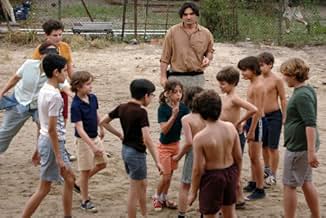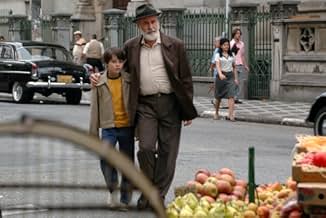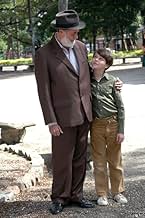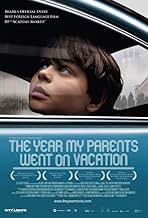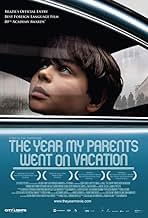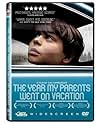L'année où mes parents sont partis en vacances
Original title: O Ano em que Meus Pais Saíram de Férias
IMDb RATING
7.3/10
6.8K
YOUR RATING
A boy is left alone in a Jewish neighborhood in 1970, when the World Cup coincides with political crackdowns by the military dictatorship.A boy is left alone in a Jewish neighborhood in 1970, when the World Cup coincides with political crackdowns by the military dictatorship.A boy is left alone in a Jewish neighborhood in 1970, when the World Cup coincides with political crackdowns by the military dictatorship.
- Awards
- 32 wins & 38 nominations total
Featured reviews
An absolutely beautiful film. We cried and we laughed. The boy is so cute and charming, but he still acted like a man when he had to. I'm telling all my friends about this little gem of a film. The political setup is based on very real events in Brazil at the same time that the international soccer star, Pele, was given an almost godlike stature in that country. The way the filmmakers manage to weave the political story, the personal story - of a boy waiting to be reunited with his parents - and the cultural "shock" of discovering the boy's Jewish roots was outstanding and very moving for me. I think this is a little gem, a masterpiece that will be enjoyed for years to come, like a Cinema Paradiso.
"O Ano em Que Meus Pais Saíram de Férias" is the most important Brazilian export of 2007, and as many said, a strong contender for the Academy Awards. The movie was beautiful: the cinematography, the music, the actors. The scenery was perfectly created and it looked perfectly like São Paulo and Brazil in the 1970's. With all that, the movie still failed to excite me or create any major emotion. The movie was very flat, and ran without a climax. Plus I wasn't very familiar with the 70's history, and the fact that the movie doesn't go deeper into the issues of the time got me a bit confused. I recommend a little researching prior to watching the movie. Overall, the movie was OK, but the characterization should have been developed further and some kind of bigger conflict should have brought excitement to the movie.
Coming of age tales seem to be old fashioned, perhaps because we've already got so many of these stories that they all seem the same. "Amarcord" (perhaps the least conventional coming of age film ever made - but what would you expect from Federico Fellini's reminiscences?), "Pelle, the Conqueror", "My Life as a Dog", "Summer of '42" and "Radio Days", just to name a few, are unforgettable films. Naturally, these stories tend to repeat old clichés, but every now and then we get a fresh and sincere coming of age film, even if it's not innovative or particularly original. "O Ano em que Meus Pais Saíram de Férias" aka "The Year My Parents Went on Vacation" is one of those. It's not in the same level as the gems I mentioned, but it's delicate and touching.
Brazil, 1970: military dictatorship haunts the nation, and 12 year-old Mauro (Michel Joelsas) is sent to live in São Paulo with his grandfather (Paulo Autran), when his parents go "on vacation". While he waits for his parents to come back, Mauro roots for Brazil to win the FIFA World Cup for the third time. The movie resembles two good recent flicks, "Kamchatka" (Argentina, 2002) and "The Miracle of Bern" (Germany, 2003), in the way it has dictatorship and soccer at the core of their stories. Without being a masterpiece, "O Ano em que Meus Pais Saíram de Férias" is a nostalgic piece about an important time in Brazilian history. Besides, it was Paulo Autran's (one of, if not THE, greatest Brazilian actors of all time) last movie - an extra reason to check it. 8/10.
Brazil, 1970: military dictatorship haunts the nation, and 12 year-old Mauro (Michel Joelsas) is sent to live in São Paulo with his grandfather (Paulo Autran), when his parents go "on vacation". While he waits for his parents to come back, Mauro roots for Brazil to win the FIFA World Cup for the third time. The movie resembles two good recent flicks, "Kamchatka" (Argentina, 2002) and "The Miracle of Bern" (Germany, 2003), in the way it has dictatorship and soccer at the core of their stories. Without being a masterpiece, "O Ano em que Meus Pais Saíram de Férias" is a nostalgic piece about an important time in Brazilian history. Besides, it was Paulo Autran's (one of, if not THE, greatest Brazilian actors of all time) last movie - an extra reason to check it. 8/10.
The premise appears simple, but that's only on surface. Suddenly, the country is divided between the euphoria of the 1970 World Cup (in which Brazil was champion for the third time) and the anguish of the dictatorship. That could be good material for biting social critique, but the movie takes a radically different path. It follows the life of a kid, whose parents are leaving for "vacations". He's left at his grandfather's apartment, only to find out that he died hours before his arrival. Finding himself in the unnatural environment of a Jewish community, having no news about his parents and having to live with a grumpy old man, he finds comfort in football and everything that deals with it.
Fans of the hyperactivity and non-linearity of City Of God will have to expect a completely different style here. While there are flashes of comedy and quirkiness, the movie is very focused and delicately paced. There isn't a lot that can be told here, really, and I won't go on spoiling the story. Check it out for yourself, if only to witness the clashing contrast between two opposite realities in a way no history book could deliver.
Fans of the hyperactivity and non-linearity of City Of God will have to expect a completely different style here. While there are flashes of comedy and quirkiness, the movie is very focused and delicately paced. There isn't a lot that can be told here, really, and I won't go on spoiling the story. Check it out for yourself, if only to witness the clashing contrast between two opposite realities in a way no history book could deliver.
Twelve-year-old Mauro (Michel Joelsas) is a soccer fan who spends hours playing table soccer in his suburban home in Belo Horizonte, Brazil and fantasizes about playing soccer with Pelé and Tostao, the heroes of the Brazilian soccer team that is about to compete for its third World Cup title. He hardly even blinks when his parents tell him that they are going on vacation and will be dropping him off at his grandfather's apartment in Sao Paolo. Brazil's official submission for the 2008 Oscars in the Best Foreign Film category, The Year My Parents Went on Vacation contains all the ingredients for a Hollywood-style exercise in cliché-ridden sentimentality an adorable young boy, a cantankerous but wise old man, and a world-class sports tournament. Yet director Cao Hamburger meshes these elements into a film that is nuanced, honest, and genuinely touching and, in the process, shows how an attitude of welcoming hospitality can make a difference in the lives of those who feel abandoned.
Set in Brazil in 1970 against a backdrop of military dictatorship, Mauro's father (Eduardo Moreira) and Catholic mother (Simone Spoladore) have been forced to go underground because of their political opposition to the government of General Emilio Medici, a military dictator but do not reveal to Mauro the truth about their leaving. Telling the boy that they will come back for him before the start of the World Cup Soccer Tournament, they deliver him to the home of his grandfather Motel (Paulo Autran) in the mostly Jewish Bom Retiro district of Sao Paulo but do not realize that grandpa has just died of a heart attack in his barbershop.
Tired of waiting for his grandfather to return, Mauro enlists the help of a neighbor, an aging Jewish bachelor Shlomo (Germano Haiut) who reluctantly takes him in but is not happy with his newfound task of caring for the youngster. He chastises the boy after he rejects eating herring for breakfast and slaps him across the face when he plays soccer in the hallways while wearing his prayer shawl. Shlomo becomes even more petulant when he inadvertently discovers that Mauro (whom he has been calling Moishela) is a "goy" who has not been circumcised (a very unlikely event when there is a Jewish father). It is only when the rabbi tells him that, like Moses, Mauro has been left on his doorstep by God that he begins to treat Moishela with respect and invites members of the local synagogue to offer him lunch each day at their different apartments.
Mauro's love of soccer helps him to befriend the local Jewish children, forming a bond with adorable 11-year-old Hanna (Daniela Piepsyk) and the community of Italian, Greek and Arab immigrants who are united in their devotion to the Brazilian soccer team. Joelsas is excellent as the highly intelligent energetic boy who must adapt to a strange environment far removed from his familiar surroundings. The film is almost stolen, however, by Piepsyk as the tomboyish Hanna who collects money from the boys to give them a peek at women trying on clothes in her mother's dress shop. When the World Cup begins, however, all the attention in the neighborhood is on soccer but for Mauro, it is mostly a reminder of his parents promise to return.
Spoken mostly in Yiddish, The Year My Parents Went on Vacation contains elements of The Cup, Running on Empty, and Under the Same Moon, but distinguishes itself by the freshness of its light-hearted approach and the outstanding performances of its mostly non-professional actors. Though not primarily a political coming-of-age film, when Hamburger deftly shifts from a rock n' roll dance floor to the sound of fascist soldiers on horseback making arrests of suspected dissidents, it is a jarring introduction to a young man's loss of innocence.
Set in Brazil in 1970 against a backdrop of military dictatorship, Mauro's father (Eduardo Moreira) and Catholic mother (Simone Spoladore) have been forced to go underground because of their political opposition to the government of General Emilio Medici, a military dictator but do not reveal to Mauro the truth about their leaving. Telling the boy that they will come back for him before the start of the World Cup Soccer Tournament, they deliver him to the home of his grandfather Motel (Paulo Autran) in the mostly Jewish Bom Retiro district of Sao Paulo but do not realize that grandpa has just died of a heart attack in his barbershop.
Tired of waiting for his grandfather to return, Mauro enlists the help of a neighbor, an aging Jewish bachelor Shlomo (Germano Haiut) who reluctantly takes him in but is not happy with his newfound task of caring for the youngster. He chastises the boy after he rejects eating herring for breakfast and slaps him across the face when he plays soccer in the hallways while wearing his prayer shawl. Shlomo becomes even more petulant when he inadvertently discovers that Mauro (whom he has been calling Moishela) is a "goy" who has not been circumcised (a very unlikely event when there is a Jewish father). It is only when the rabbi tells him that, like Moses, Mauro has been left on his doorstep by God that he begins to treat Moishela with respect and invites members of the local synagogue to offer him lunch each day at their different apartments.
Mauro's love of soccer helps him to befriend the local Jewish children, forming a bond with adorable 11-year-old Hanna (Daniela Piepsyk) and the community of Italian, Greek and Arab immigrants who are united in their devotion to the Brazilian soccer team. Joelsas is excellent as the highly intelligent energetic boy who must adapt to a strange environment far removed from his familiar surroundings. The film is almost stolen, however, by Piepsyk as the tomboyish Hanna who collects money from the boys to give them a peek at women trying on clothes in her mother's dress shop. When the World Cup begins, however, all the attention in the neighborhood is on soccer but for Mauro, it is mostly a reminder of his parents promise to return.
Spoken mostly in Yiddish, The Year My Parents Went on Vacation contains elements of The Cup, Running on Empty, and Under the Same Moon, but distinguishes itself by the freshness of its light-hearted approach and the outstanding performances of its mostly non-professional actors. Though not primarily a political coming-of-age film, when Hamburger deftly shifts from a rock n' roll dance floor to the sound of fascist soldiers on horseback making arrests of suspected dissidents, it is a jarring introduction to a young man's loss of innocence.
Did you know
- TriviaBrazil's Official Submission to the Best Foreign Language Film Category of the 80th Annual Academy Awards. The film was one of the nine films that made it to the January's short list but failed to secure the nomination.
- GoofsWhen Mauro arrives in São Paulo, he looks out to the car window noticing the tall buildings - the known Banespa Tower (now Farol Santander) and the Marchetti building, located in the city's downtown. Not only it's a shot on reverse but completely unpractical to the place he and his parents were going - Bom Retiro is located below downtown - and the particular area they were going, shot from right to the left, is completely off traffic since it's an one-way street that only moves from left to right.
- ConnectionsFeatured in Por Dentro do Filme 'O Ano em que Meus Pais Saíram de Férias' (2006)
Details
- Release date
- Country of origin
- Languages
- Also known as
- The Year My Parents Went on Vacation
- Filming locations
- Production companies
- See more company credits at IMDbPro
Box office
- Budget
- R$3,000,000 (estimated)
- Gross US & Canada
- $807,117
- Opening weekend US & Canada
- $80,655
- Feb 17, 2008
- Gross worldwide
- $3,218,370
- Runtime1 hour 50 minutes
- Color
- Sound mix
- Aspect ratio
- 1.85 : 1
Contribute to this page
Suggest an edit or add missing content

Top Gap
By what name was L'année où mes parents sont partis en vacances (2006) officially released in India in English?
Answer






